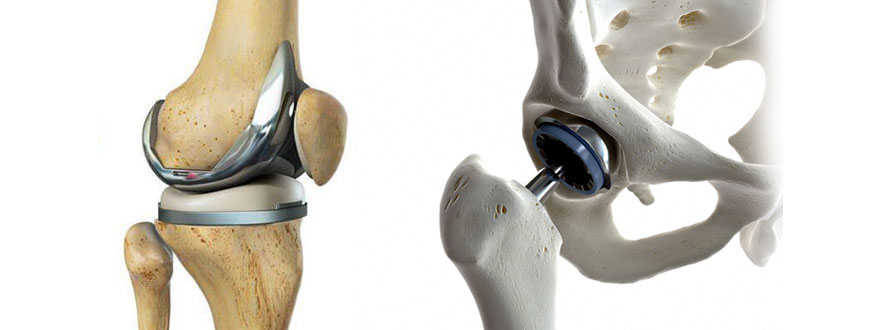Joint Replacement

Joint replacement, also known as arthroplasty, is a surgical procedure in which a damaged or diseased joint is replaced with an artificial joint, called a prosthesis, to restore function, alleviate pain, and improve mobility. Joint replacement surgery is most commonly performed on weight-bearing joints such as the hip and knee, but it can also be done on other joints such as the shoulder, elbow, and ankle.
Here's an overview of joint replacement:
- Indications: Joint replacement surgery is typically recommended for individuals with severe joint pain, stiffness, and functional limitations due to:
- Osteoarthritis: A degenerative joint disease characterized by the breakdown of cartilage in the joint, resulting in pain, inflammation, and loss of joint function.
- Rheumatoid arthritis: An autoimmune condition that causes chronic inflammation of the joint lining (synovium), leading to cartilage destruction, joint deformity, and functional impairment.
- Traumatic injury: Severe joint injuries, fractures, or damage to joint structures may require joint replacement surgery to restore stability and function.
- Other degenerative joint diseases, such as avascular necrosis, post-traumatic arthritis, or congenital joint abnormalities.
- Recovery and Rehabilitation:
- Postoperative care: Following joint replacement surgery, the patient is closely monitored in the hospital for pain management, wound healing, and early mobilization.
- Physical therapy: Rehabilitation exercises and physical therapy are essential components of recovery to improve joint mobility, strength, and function, and to prevent complications such as stiffness or muscle weakness.
- Home exercise program: Patients are typically provided with a personalized home exercise program to continue rehabilitation and promote optimal recovery after discharge from the hospital.
- Return to activity: Most patients can expect to gradually resume normal activities of daily living and low-impact exercises within a few weeks to months after joint replacement surgery, although the timeline may vary depending on individual factors such as age, overall health, and the type of joint replaced.
- Outcomes: Joint replacement surgery is highly successful in relieving pain, restoring function, and improving quality of life for most patients.


